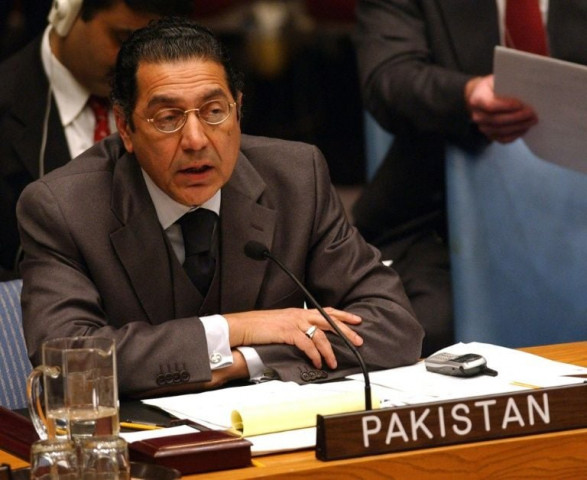Pakistan urges UNSC to reign in India’s fascist ambitions
Ambassador Munir Akram urges 15-member council to denounce atrocities in IOJ&K

Pakistan has urged the United Nations Security Council (UNSC) to end the “open aggression and atrocities” against the Kashmiri people by India, which had “callously exploited” the coronavirus crisis to further advance its occupation of the disputed territory.
Addressing a virtual high-level meeting of the UNSC to discuss the effect of the pandemic on peace and security, Pakistan Permanent Representative Munir Akram said that the people in Indian-occupied Jammu and Kashmir (IOJ&K) has now been condemned to a “double lockdown”.
“The council must denounce India’s illegal actions in occupied Jammu and Kashmir and take urgent actions to reign in its fascist ambitions that are putting enormous strain on peace and security of our region and beyond,” Ambassador Akram told the 15-member body.
The high-level debate, convened by Germany as president of the council for July, followed last week’s passage of resolution 2532 (2020), which demands a general and immediate cessation of hostilities in all situations on its agenda.
Noting that while there has been no real reduction in violence in many of world’s conflict zones, Ambassador Akram said some states had taken advantage of this situation to consolidate their illegal occupations of foreign and disputed territories.
“For over 10 months,”, he said, “the Kashmiris have faced crippling restrictions on civil liberties and unrelenting human rights abuses” at the hands of Indian forces. “The coronavirus has now condemned them to a ‘double lockdown’ bringing them to the precipice of a vast human tragedy,” he added.
The prolonged Kashmir lockdown had already depleted essential medical supplies in hospitals, turning them into graveyards and rendering Indian authorities incapable of meeting the public health crisis, the Pakistani envoy said.
“While the world’s attention is focused on the virus, India has taken advantage by implementing additional steps to consolidate its occupation. Besides the extended lockdown and communications blackout, India has introduced new ‘domicile rules’ to engineer a demographic change in Kashmir, to transform it from a Muslim majority State into a Hindu majority territory,” he said.
“These measures are in direct contravention of the relevant United Nations Security Council resolutions and international law, in particular the Fourth Geneva Convention. Hundreds of senior Kashmiri political leaders and thousands of young men, including human rights defenders and journalists have been arbitrarily detained and incarcerated to stifle the call for freedom and suppress their legitimate struggle for right to self-determination,” he added.
“Peaceful protestors, including children as young as 4, have been blinded by pellet guns; women and girls dishonoured and threatened with rape and violence; hundreds killed in extrajudicial executions, whole neighbourhood destroyed as ‘collective punishment’”.
The council, Ambassador Akram emphasised, must denounce India’s illegal actions in Kashmir and take urgent actions to reign in its “fascist ambitions that are putting enormous strain on peace and security of our region and beyond”.
In this regard, he said, the council must urge India to: lift the military siege in Kashmir and rescind its illegal actions since 5 August 2019, when New Delhi annexed the disputed region; remove restrictions on communication, movement and peaceful assembly; allow access to international human rights organisations to undertake relief efforts; release detained and incarcerated Kashmiri political leadership; reverse new domicile rules designed to change the demographic structure of Kashmir; remove draconian laws that enable Indian forces to commit rights violations with impunity; and protect Muslim minority in India from apartheid-like oppression.
“These actions are urgently need not just to calm down tension in our region, but are also imperative for the credibility of the Security Council and the continued efficacy of the United Nations in matters related to peace and security,” Ambassador Akram said.



















COMMENTS
Comments are moderated and generally will be posted if they are on-topic and not abusive.
For more information, please see our Comments FAQ